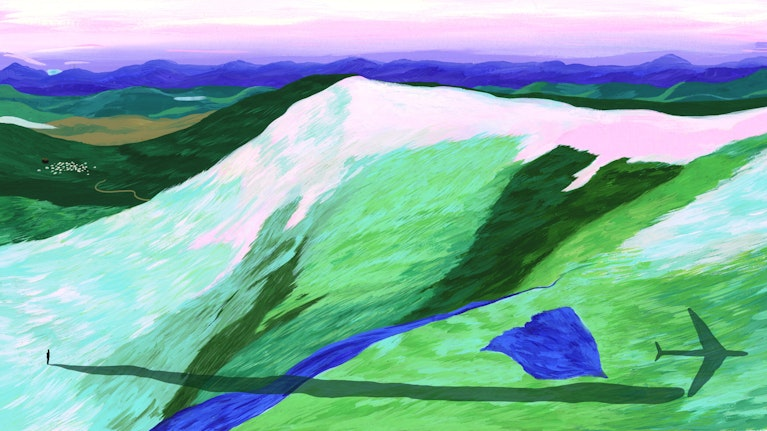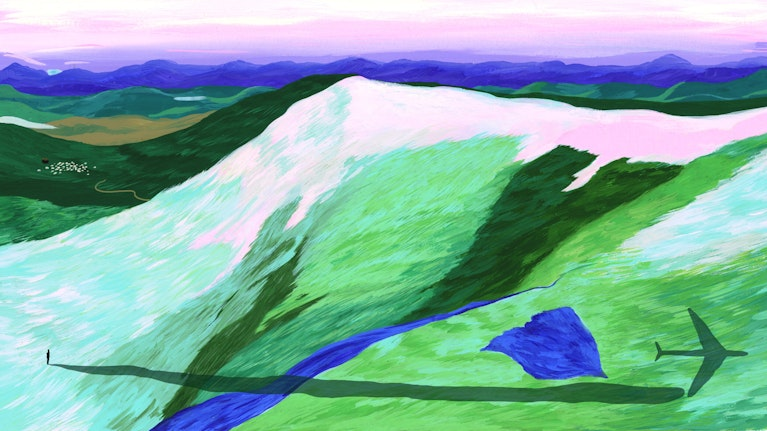
Lili Wood for Noema Magazine
Of the three stages of a pilgrimage — departure, initiation and return — the last is the least examined and perhaps most important.
BY NICK HUNT Nick Hunt is the author of three travel books about walking in different parts of Europe, two of which were finalists for the Edward Stanford Travel Book of the Year.
The flight from Istanbul to London took about four hours. Leaving the Balkans behind, my body traveled at a speed of 400 miles an hour over the Great Hungarian Plain, the snowy mountain passes of the Alps, the forests of southwest Germany, the Rhine and the Low Countries. Through the blurry windowpane I watched the continent slide by, its greens and browns smeared together like a spill of paint. Mountain ranges passed in minutes, great rivers in seconds. I tried to spot landmarks — Had I walked through that woodland? Had I crossed a bridge down there? — but none of it seemed remotely real. As the plane touched down in London, I had the sense that somehow, something had gone extremely wrong.
Seven months before, I had embarked on that journey in reverse. In the winter of 2011, I took the overnight ferry from Harwich to the Hook of Holland. Then I started walking and continued for 2,500 miles. My journey followed the footsteps of the travel writer Patrick Leigh Fermor, who completed his “great trudge” on New Year’s Day 1935, and took me through the Netherlands, Germany, Austria, Slovakia, Hungary, Romania, Bulgaria and Turkey to the shore of the Bosporus.
I slept on couches, in the ruins of castles and abandoned hunting hides. I got lost in graffitied city streets and in snowbound forests. I spent the vast majority of those months alone, talking to myself with a lack of self-consciousness that at times alarmed me. Birdsong, the roar of cars, church bells, cowbells, outraged dogs, the rush of rivers and the patter of rain kept me steady company. The sound I heard more than anything else was the crunch, crunch, crunch of my boots on the road.
By the time I got to Istanbul, those boots were full of holes. My skin was scorched from the sun, and I had a matted beard and a stench I hardly recognized; even after multiple baths, I couldn’t shift that smell for weeks. For hundreds of miles, through rain and snow, skirting autobahns and being chased by dogs, I’d been dreaming of my arrival in the place that Leigh Fermor had set his sights on 79 years before: “The chief destination was never in a moment’s doubt,” he wrote. “The levitating skyline of Constantinople pricked its sheaves of thin cylinders and its hemispheres out of the sea-mist.”
But my arrival didn’t feel like that. I was beyond exhaustion. I limped to the quayside, sat down and dragged off my stinking boots. The call to prayer was sounding, and the sky was full of seagulls. I felt happy, but in a distant way. Mostly, I felt like crying.
Originally, I’d planned to return home slowly, a gradual re-acclimatization over weeks by way of trains and buses. But having reached my destination, I was just too tired. I’d done what I set out to do. My purpose seemed concluded.
Hence the flight, and a walk that had taken 221 days compressed, with a violence that startled me, into 240 minutes.
“Travel has a warping effect on time, elongating it in some ways while compressing it in others.”
Returning home after being away for any length of time is strange. The Moroccan explorer Ibn Battuta, who journeyed 70,000 miles across much of the 14th-century Islamic world, wrote that “traveling gives you home in a thousand strange places, then leaves you a stranger in your own land.” I’d venture that all travelers, whether they have been away for years, months or only weeks, know something of this estrangement. What gap year student hasn’t returned from their rite-of-passage journey to find that the “gap” now lies between them and their former life? This peculiar dislocation — a kind of out-of-body experience — might wear off after several days, or it might last much longer.
For me it lasted for at least the same period as my absence. During that time I tried and failed to slot back into my old life, but everything seemed misaligned. The familiar sights around me had become foreign. One of the most confounding things was that my mental map of London — a city I’d learned street by street in the era before Google Maps, cycling for hours each day with a battered A-Z map — had completely vanished, as if the data had been wiped. I constantly found myself lost in neighborhoods I had known for years.
This cartographic distortion was accompanied by a temporal one. Travel, as has often been noted, has a warping effect on time, elongating it in some ways while compressing it in others. Like Einstein’s theory of general relativity, the bigger the journey and the greater its gravitational pull on the trajectory of your life, the more the temporal field around it seems to become dilated. It can feel like you’ve been gone for a lifetime and have changed irrevocably, and yet when you return, time has apparently stood still…
more…
https://www.noemamag.com/traveling-at-the-speed-of-the-soul/



